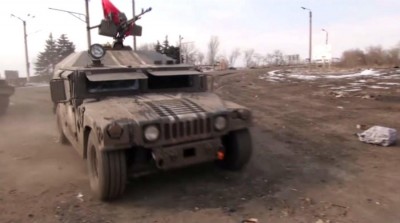US Weapons Falling in the Hands of the Islamic State (ISIS): “2,300 Humvees in Mosul alone”

Iraq has admitted that ISIS jihadists captured huge caches of US-made weapons, including thousands of Humvees seized from Iraqi forces retreating from Mosul last year. The spoils of war have since then been used by ISIS to gain ground in Iraq and Syria.
“In the collapse of Mosul, we lost a lot of weapons,” Prime Minister Haider al-Abadi said in an interview with Iraqiya state TV. “We lost 2,300 Humvees in Mosul alone.”
Islamic State (IS, formerly ISIS/ISIL) captured Iraq’s second city of Mosul in June 2014, as government forces retreated from the country’s Sunni stronghold.
The number of potential heavy and light weapons abandoned by Iraq’s army remains unknown but over the past decade the US sold thousands of the armed vehicles to the Iraqis, in addition to tanks and other military hardware.
Just this month the Pentagon estimated that at least half a dozen tanks were abandoned when Baghdad forces lost Ramadi, in addition to artillery pieces, and some 100 Humvees.
Meanwhile the US approved new arms deliveries to the Iraqis last December to replenish the stock ransacked by IS. One contract allows the sale of 175 heavy M1A1 Abarams worth $12.4 billion, while another approves the delivery of 1,000 Humvees, equipped with M2.50 caliber machine guns and MK-19 40mm grenade launchers.
They are exactly the types of weapons IS used to gain vast amount of territory both in Iraq and northern Syria. In fact, the first use of US-Humvees on Syrian territory was reported last year shortly after Mosul has fallen to jihadists.
In mid-May IS gained control of the capital of Anbar province where Iraqi forces had held out against militants for more than a year. They also secured control of Palmyra in Syria, carrying out many executions.
US intelligence points to growing IS strength
Meanwhile on Sunday CIA Director John Brennan acknowledged that IS gains in both Iraq and Syria did not really come as a surprise to the intelligence community.
“I went back over the intelligence of last week, taking a look at what we knew and when we knew it about ISIS and its movements inside of Iraq and Syria,” Brennan said in an interview on CBS’ Face the Nation.“We saw a growing strength.”
He attributed ISIS success to “a lot of factors” on the ground that came into play, in particular the lack of leadership in some Iraqi units and logistic support needed to fight extremists.
While the Iraqi troop’s failures could have looked as a “lack of a will to fight,” Brennan says in fact “there has been a fair amount of intelligence about the growing capabilities of ISIS as well as the challenges that beset the Iraqi government.”

